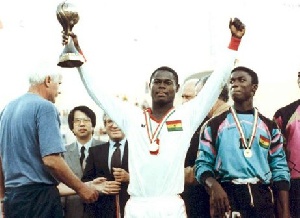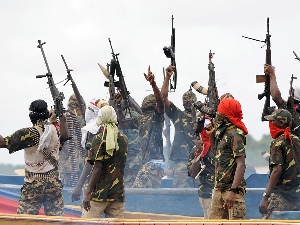For someone who was earmarked as the “apparent heir to Pele", the storm never seems to be over for Nii Odartey Lamptey.
The latest saga about him suspecting infidelity about his wife thus requesting a DNA-based paternity test only adds to his collections of sad incidents and grief.
Going through a traumatic childhood now appears to make him more vulnerable to stressful events even much later in his life.
Odartey Lamptey had a hard time growing up. He faced life’s harshest realities and toughest challenges. He had to deal with an alcoholic father, who burnt him with cigarette butts at the slightest provocation, and an abusive mother, who was only protective in isolated instances.
"I would go and play football and coming home I would be beaten, or sent to go and fetch water before they would give me food," he said of his early life. "Some nights I would sleep under a car or a kiosk, and the next day start my life again,” he told the Independent's Jonathan Wilson.
His childhood came with losses and lessons through less triumphs and was marked with doubts, second guesses, and exploring unknowns. Even when he thought he had evaded the scorn of his parents to go play football, his dad will come after him hurling a loud cry for him to leave the pitch. If there were ever a definitive path to happiness and success for the other children playing his favourite sport with him, everyone would be on it. Bar Odartey Lamptey. The severe suffering wasn't to end anytime soon. His dad divorced his mom and moved from Accra to Kumasi with him. A new set of tribulation and distress awaited him from his stepmother.
"There was a new marriage and me being there was a big problem," he said. "His new wife didn't want a new son. My father used to beat me, but I got used to it and did not cry any more. So he would smoke a cigarette and burn me with it." These experiences were brutal on his character and his growth. They knocked him down and kept him there for a while.
But when his time of mourning was over after each tragedy, he pressed forward, stronger, and with a greater understanding and respect for life.
He couldn't bear this harsh brunt anymore so he moved out of his dad's new marital home to join Kaloum Stars, a team he had started playing for without his dad's approval. A new challenge awaited him.
"They were Muslims," he said, "and because of that I had to become a Muslim. It was very difficult. I would be in the mosque praying and he [his father] would come and there would be a fight there."
[He reconciled with his dad - who died later due to an alcohol-related illness - in 1997 and readopted his faith in Christianity]
At this point, Odartey Lamptey had slowly carved a niche as a very creative player playing juvenile football. His short stature and physical vulnerability didn't look like weaknesses. He always represented a constant threat to opposing defenses, who were unable to stop his blend of intelligence and perceptiveness as both a creator and scorer of goals. Odartey Lamptey's trajectory to success well and truly was on course.
At 8, a cream of top clubs were already lining up to pick the high-profile player away.
At 13, he was already playing in Under-20 competitions.
At 14, the skillful player was an integral member of Ghana's squad at the World Under-16 Championship in Scotland [a tournament where his quality saw Pele hailing him as his natural successor].
At 16, he was playing international football for Ghana.
If Odartey Lamptey was suffering from the emotional upheaval of the past years, then he was not showing it to the world at this point.
But his dark moments were not over. After impressing scouts at the Under-16 tournament in Scotland, he instantly become a must-have player. Rangers, Vasco da Gama and Anderlecht were hell-bent over getting him to play for their club. It was Anderlecht who made first step of getting him into their ranks.
Stephen Keshi, Anderlecht's Nigerian centre-back at the time, and an agent were given the huge task of luring him. But there was a bureaucratic barrier that looked like derailing this opportunity. The Ghana Football Association had strong desires to keep the squad together, so they confiscated all the passports of these players.
"That guy came to our training camp and he spoke to me, he said Keshi wanted to bring me to Europe," Lamptey remembers. "The GFA were very annoyed at him for coming to talk to me and wanted to arrest him. I had to beg on his behalf. When he was leaving he gave me his card."
That looked like the end of his Anderlecht dreams and aspirations. But Odartey had an audacity of hope, a hope that was sitting on a time-bomb.
Just two weeks after receiving the Anderlecht agent's card, Odartey Lamptey set out after him. And till this day, he still remembers the date: On 15 August 1989.
"I did not tell anybody, not even my parents, and I took the small amount of money I had and went to the bus station and met a car driver who was going to Nigeria," he said, speaking to Jonathan Wilson of the Independent. "I told him I didn't have a passport but wanted to go to Lagos. He said if I could pay him he'd take me and pretend I was his son."
He faked sickness, hid behind driver's seats, couldn't afford two square meals in a day and got Keshi to fake a passport that proved he was his son. But he was at Anderlecht now, which his end to all these means.
One would have thought that was the end of his run with bad times. The worst was to follow.
Even when he won the player of the tournament as Ghana won the World Under-17 Championship in 1991 in Italy and won his full international for Ghana playing against Togo, he was faced with even tougher challenges.
"I was vomiting blood on the pitch," he said – the result, he believed, was a curse placed on him by members of Kaloum Stars who were angry that he had abandoned them.
But he still kept his head up and played distinctively well for Anderlecht where he made 30 appearances and score 9 goals. At this point, he had established himself as a prolific scorer, dazzling onlookers with his flashy play and obvious talent. After two highly spectacular seasons, he was transferred to PSV Eindhoven, where he made a similar impact and awed fans and experts with his game scoring 10 goals in 22 appearances. But his date with misfortune will stare him in the face again.
Odartey quit PSV to Aston Villa, which was a strange decision as PSV was a more established and successful club than Aston Villa at the time. It would turn out that his nefarious agent, Antonio Caliendo, was the man who orchestrated this silly decision.
In his mind, Odartey thought he had signed an exclusive marketing contract with an Italian agent who would look out for his best interests. But Caliendo was bagging more than 25% of the fee any transfer of Lamptey will bring. When Odartey realised this, it was a little too late.
He couldn't keep his head straight at the club and was only able to make 10 appearances without scoring three goals [all of which came in the League Cup against Wigan Athletic- once in the home leg and twice in the away leg.] That was the beginning of his doomsday.
He went on to play for Coventry City, Venezia [then to Boca Juniors, but was the fifth foreigner in a team only permitted four and was loaned out to Union de Santa Fe], Ankaragücü, União Leiria, Greuther Fürth where he scored 5 goals in 36 appearances, Shandong Luneng where he scored 7 goals in 37 appearances and then Al-Nasr Dubai.
But at Union de Santa Fe, he went through one of his lowest moments once again. His wife, Gloria gave birth to their son, Diego [who he named after Argentine legend, Maradona] but death took the little boy away.
"He came one month early, and the doctor said he was okay," Lamptey remembers. Lamptey broke his contract with the club to take his son to hospital in Buenos Aires. The boy had severe breathing difficulties and despite a battery of tests, doctors could not crack the mystery illness. "He was [in hospital] for about two-and-a-half months, so he was about four months old when he passed away in intensive care," Lamptey said.
"They did everything, all the tests, but he could not breathe."
In Turkey whilst playing for Ankaragucu, he lost his daughter, Lisa, to the same mystery illness. Things were really falling apart for Odartey Lamptey. But the lowest point in Odartey's life was to come this week. He learnt, rather surprisingly, that the three children he has fathered all through these years are not "his biological kids".
A DNA he had conducted to establish the real paternity of the kids came out with gripping revelations that the three kids do not belong to him. According to reports, Nii Odartey Lamptey has suspected his wife of infidelity for several years but decided to stay in the marriage out of love and the chain of businesses they own together.
Odartey Lamptey must be seething with rage and pain at this point. How on God's green earth is he always clouded with misfortunes and strokes of bad luck? For a player who was meant to symbolize the rise in quality of the game in Africa, how he bowed from the sport was a disastrous symbolization. Now his off the pitch serenity has been disturbed and his dirty lining have been a matter of public discussion.
He has crumbled under the pressure, never getting anywhere close to achieving the potential he showed as a youngster. And same looks like being the case in his private life.
But like before, he'll find a window of hope to rise again.
Sports Features of Monday, 2 December 2013
Source: lexis koufie-amartey/footy-ghana.com













